英语读写译b3U7
- 格式:ppt
- 大小:3.32 MB
- 文档页数:46
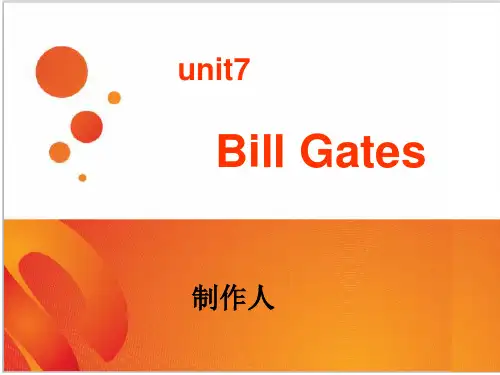
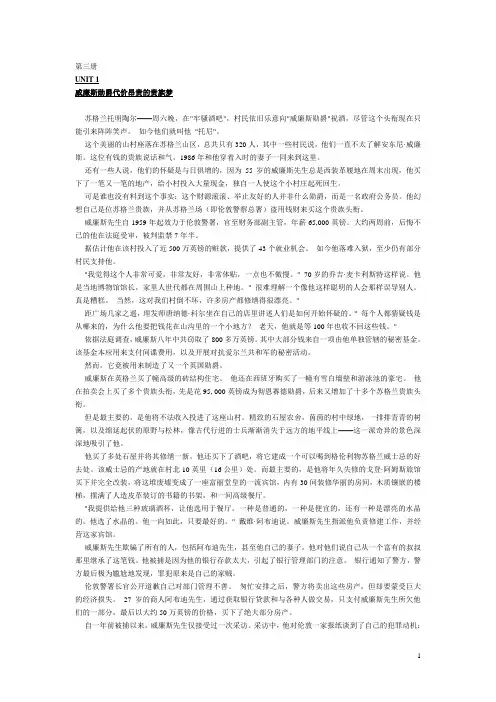
第三册UNIT 1威廉斯勋爵代价昂贵的贵族梦苏格兰托明陶尔——周六晚,在"牢骚酒吧",村民依旧乐意向"威廉斯勋爵"祝酒,尽管这个头衔现在只能引来阵阵笑声。
如今他们就叫他"托尼"。
这个美丽的山村座落在苏格兰山区,总共只有320人,其中一些村民说,他们一直不太了解安东尼·威廉斯。
这位有钱的贵族说话和气,1986年和他穿着入时的妻子一同来到这里。
还有一些人说,他们的怀疑是与日俱增的,因为55岁的威廉斯先生总是西装革履地在周末出现,他买下了一笔又一笔的地产,给小村投入大量现金,独自一人使这个小村庄起死回生。
可是谁也没有料到这个事实:这个财源滚滚、举止友好的人并非什么勋爵,而是一名政府公务员。
他幻想自己是位苏格兰贵族,并从苏格兰场(即伦敦警察总署)盗用钱财来买这个贵族头衔。
威廉斯先生自1959年起效力于伦敦警署,官至财务部副主管,年薪65,000英镑。
大约两周前,后悔不已的他在法庭受审,被判监禁7年半。
据估计他在该村投入了近500万英镑的赃款,提供了43个就业机会。
如今他落难入狱,至少仍有部分村民支持他。
"我觉得这个人非常可爱,非常友好,非常体贴,一点也不傲慢。
" 70岁的乔吉·麦卡利斯特这样说。
他是当地博物馆馆长,家里人世代都在周围山上种地。
" 很难理解一个像他这样聪明的人会那样误导别人。
真是糟糕。
当然,这对我们村倒不坏,许多房产都修缮得很漂亮。
"距广场几家之遥,理发师唐纳德·科尔坐在自己的店里讲述人们是如何开始怀疑的。
" 每个人都猜疑钱是从哪来的,为什么他要把钱花在山沟里的一个小地方?老天,他就是等100年也收不回这些钱。
"依据法庭调查,威廉斯八年中共窃取了800多万英镑。
其中大部分钱来自一项由他单独管辖的秘密基金。
该基金本应用来支付间谍费用,以及开展对抗爱尔兰共和军的秘密活动。
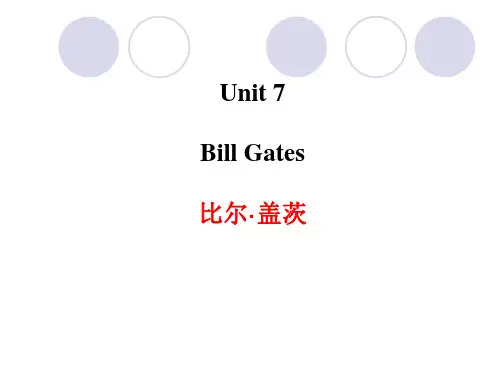
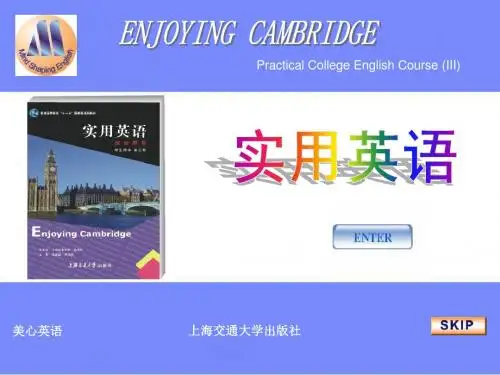
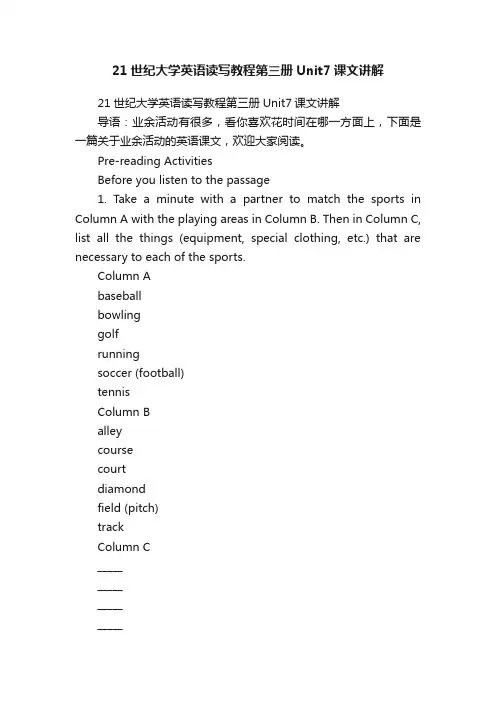
21世纪大学英语读写教程第三册Unit7课文讲解21世纪大学英语读写教程第三册Unit7课文讲解导语:业余活动有很多,看你喜欢花时间在哪一方面上,下面是一篇关于业余活动的英语课文,欢迎大家阅读。
Pre-reading ActivitiesBefore you listen to the passage1. Take a minute with a partner to match the sports in Column A with the playing areas in Column B. Then in Column C, list all the things (equipment, special clothing, etc.) that are necessary to each of the sports.Column Abaseballbowlinggolfrunningsoccer (football)tennisColumn Balleycoursecourtdiamondfield (pitch)trackColumn C______________________________Now listen to the passage2. Which sport is it about? Compare your equipment list with the equipment mentioned on the tape. What attracts you to the activities that you enjoy in your spare time? How important is it to you to "do them right"?So What's So Bad About Being So-So?Lisa Wilson StrickThe other afternoon I was playing the piano when my seven-year-old walked in. He stopped and listened for a while, then said: "You don't play that thing very well, do you, Mom?"No, I don't. My performance would make any serious music student weep, but I don't care. I've enjoyed playing the piano badly for years.I also enjoy singing badly and drawing badly. I'm not ashamed of my incompetence in these areas. I do one or two other things well and that should be enough for anybody. But it gets boring doing the same things over and over. Every now and then it's fun to try something new.Unfortunately, doing things badly has gone out of style. It used to be a mark of class if a lady or a gentleman sang a little, painted a little, played the violin a little. You didn't have to be good at it; the point was to be fortunate enough to have the leisure time for such pursuits. But in today's competitive world we have to be "experts" even in our hobbies.You can't tone up your body by pulling on your gym shoes and jogging around the block a couple of times anymore. Why? Because you'll be laughed off the street by the "serious runners" — the ones who run twenty miles or more a week in their sixty-dollar running suits and fancy shoes. The shoes are really a big deal. If you say you're thinking about taking up almost any sport, the first thing the "serious" types will ask is what you plan to do about shoes. Leather or canvas? What type of soles? Which brand? This is not the time to mention that the gym shoes you wore in high school are still in pretty good shape. As far as sports enthusiasts are concerned, if you don't have the latest shoes you are hopelessly committed to embarrassing yourself.The runners aren't nearly so snobbish as the dancers, however. In case you didn't know, "going dancing" no longer means putting on a pretty dress and doing a few turns around the dance floor with your favorite man on Saturday night. "Dancing" means squeezing into tights and leg warmers, then sweating through six hours of warm-ups, five hours of ballet and four hours of jazz classes. Every week. Never tell anyone that you "like to dance" unless this is the sort of activity you enjoy.Have you noticed what this is doing to our children? "We don't want that nerd on our soccer team," I overheard a ten-year-old complain the other day. "He doesn't know a goal kick from a head shot." As it happens, the "nerd" that the boy was talking about was my son, who did not — like some of his friends — start soccer instruction at age three. I'm sorry, Son, I guess I blew it. In my day, when we played baseball, we expected to give a little instruction to the younger kids who didn't know how to play. It didn't matter if they were terrible; we weren't out to slaughter the other team. Sometimes we didn't even keep score. T o us, sports were just a way of having a good time.I don't think kids have as much fun as they used to. Competition keeps getting in the way. The daughter of a neighbor is a nervous wreck worrying about getting into the besttennis school. "I was a late starter," she told me, "and I only get to practice five or six hours a week, so my technique may not be up to their standards." The child is nine. She doesn't want to be a tennis player when she grows up; she wants to be a nurse. I asked what she likes to do for fun in her free time. She seemed to think it was an odd question. "Well, I don't actually have a lot of free time," she said. "Homework and tennis and piano lessons kind of eat it all up. I have piano lessons three times a week now, so I have a good shot at getting into the all-state orchestra."Ambition, drive and the desire to excel are all great within limits, but I don't know where the limits are anymore. I know a woman who's been complaining for years that she hasn't got the time to study a foreign language. I've pointed out that an evening course in French or Italian would take only a couple of hours a week, but she keeps putting it off. I suspect that what she hasn't got the time for is to become completely fluent within one year — and that any lower level of accomplishment would embarrass her. Instead she spends her evenings watching TV and tidying up her closets —occupations at which no particular expertise is expected.I know lots of other people, too, who avoid activities they might enjoy because they lack the time or the energy to tackle them "seriously." It strikes me as so silly. We are talking about recreation. I have nothing against self-improvement. But when I hear a teenager muttering "practice makes perfect" as he grimly makes his four-hundred-and-twenty-seventh try at hooking the basketball into the net left-handed, I wonder if some of us aren't improving ourselves right into the insane asylum.I think it's time we put a stop to all this. For sanity's sake, each of us should vow to take up something new this week — and tomake sure we never master it completely. Sing along with grand opera. Make peculiar-looking objects out of clay. I can tell you from experience that a homemade cake still tastes pretty good even if it doesn't look perfect. The point is to enjoy being a beginner again; to rediscover the joy of creative fooling around. If you find it difficult, ask any two-year-old to teach you. Two-year-olds have a gift for tackling the impossible with enthusiasm; repeated failure hardly discourages them at all.As for me, I'm getting a little out of shape, so I'm looking into golf. A lot of people I know enjoy it, and it doesn't look too hard. Given a couple of lessons, I should be stumbling gracelessly around the golf course and playing badly in no time at all. New Wordsso-soa.& ad.(infml) neither very bad(ly) nor very good/well 不好也不坏的(地)momn. (美口)妈妈incompetencen. the lack of skill or ability to do a task successfully 不胜任,不称职* competencen. skill or ability to do a task successfully 能力;称职boringa. dull and uninteresting 乏味的;令人厌倦的leisuren. time free from work or other duties; spare time 闲暇gymn. (infml) (=gymnasium) a room or hall with apparatus for physical exercise 体操馆;健身房gym shoen. 体操鞋,球鞋solen. the bottom part of a shoe or sock 鞋底;袜底a. being the only one; belonging to one and no others 唯一的;独占的enthusiastn. a person who is very interested in sth. 热衷于…的人squeezevt. 1. force or press (sb. or sth. into a small space) 硬塞,硬挤2. press firmly from two sides 挤压,榨n. 1. an act of pressing in from two sides 挤压,榨2. tight economic circumstances 经济困难;拮据tightsn. [复]女用(连)裤袜leg warmersn. [复]暖腿套warm-upn. an act or a period of preparation for physical exercise, a performance, etc. 准备活动;准备练习* overhearvt. hear (sb., a conversation, etc.) without the knowledge of the speaker(s); hear by chance 偷听到;无意中听到goal kickn. 球门球* slaughtervt. 1. kill (an animal), esp. for food; kill (people or animals) violently and in large numbers 屠宰;屠杀2. (infml) defeat (sb.) badly in sports or games (口)使惨败wreckn. 1. (usu. sing) (infml) a person whose health, esp. mental health, has been seriously damaged 受到严重损害的人2. a ship lost at sea; a plane, car, etc. which is badly damaged in an accident 遇难船只;失事飞机等的残骸vt. cause (a ship) to be destroyed; (fig.) destroy, ruin 造成(船舶等)失事;(喻)破坏orchestran. a (usu. large) group of people playing various musical instruments together 管弦乐队limitn. (oft. pl.) the greatest extent of sth. that is possible or allowed 限度;范围vt. keep within a certain size, amount, number, area, or place; restrict 限制;限定limiteda. small in amount, power and not able to increase 有限的tidyvt. make (sb. or sth.) neat or in order 使整洁,使整齐a. neat and in order; liking things to be neatly arranged 整洁的;爱整洁的* recreationn. an activity done for enjoyment when one is not working 消遣,娱乐self-improvementn. improvement of one's character, mind, etc., by one's own efforts 自我改进,自我修养grimlyad. in a determined manner 坚定地;不屈地* insanea. 1. 精神病患者的;为疯人而设的2. (of people or their acts) mad (患)精神病的;精神失常的asylumn. 收容所;精神病院insane asylumn. a mental hospital 精神病院sanityn. the state of having a normal healthy mind; the state of being sensible or reasonable; good sound judgement 神智健全;清醒,明智operan. 歌剧peculiar-lookinga. 奇形怪状的peculiara. 1. odd, strange 奇特的,古怪的2. (to) belonging, relating only (to a particular person, place or time) 独有的,特有的clayn. 黏土homemadea. made at home, rather than in a shop or factory 家制的;做得简单粗糙的discouragevt. take away (sb.'s) confidence or (sb.'s) hope of doing sth. 使泄气,使灰心* stumblevi. 1. walk in a clumsy way 跌跌撞撞地走2. speak or perform with many mistakes or hesitations 结结巴巴地说话gracelesslyad. not attractively or elegantly; in a clumsy manner 不优美地,笨拙地gracen. 1. elegance in movement or behaviour 优美;风度2. kindness; willingness to do what is right 善意;体谅gracefula. 1. (of movement or shape) attractive to see 优美的'2. (of a speech or feeling) suitably and pleasantly expressed 优雅的;得体的* graciousa. polite, kind and pleasant, esp. to people of a lower social position 亲切的,和蔼的Phrases and Expressionstone upmake (one's body) stronger, fitter, etc. 使更强壮,使更健康pull onput (sth.) on by pulling 穿上,戴上a big dealsth. important 了不起的事,大事take upstart to learn or practice (a hobby) 开始从事in good shapein good condition 处于良好状况be committed tocare a lot about (a cause, one's job. etc.); be loyal to (a particular ideal) 献身于,忠诚于squeeze intoforce or press into a narrow or restricted space 硬塞进…,硬挤入…as it happens(used before saying sth. surprising) actually; in fact 碰巧,偶然blow it(俚)把这事弄得一团糟keep score(在比赛中)记分get in the way (of sth./of -ing); get in sb.'s wayprevent or interfere with sth.; prevent sb. from doing sth.; block sb.'s progress 妨碍;挡道kind of(infml) somewhat; to some extent (口)有点儿;可以这么说eat upuse (sth.) in large quantities 消耗;用完have a shot at(infml) attempt to do (sth.) (口)尝试;试着去做(某事)put offdelay (doing sth.) 推迟;拖延tidy upmake (sb./oneself/sth.) neat and orderly 整理,收拾put a stop toensure that a process, habit, etc., ends and will not be repeated 制止,使停止make sth. out ofconstruct, create or prepare sth. by combining materials or putting parts together 用…做出…fool aroundbehave in a manner that isn't serious; waste time; do sth. just for fun (口)闲荡,混日子out of shapenot fit 处于不良的(健康)状况in no timevery quickly 立刻,马上Proper NamesLisa Wilson Strick莉莎·威尔逊·斯特里克(女子名)下载全文下载文档。
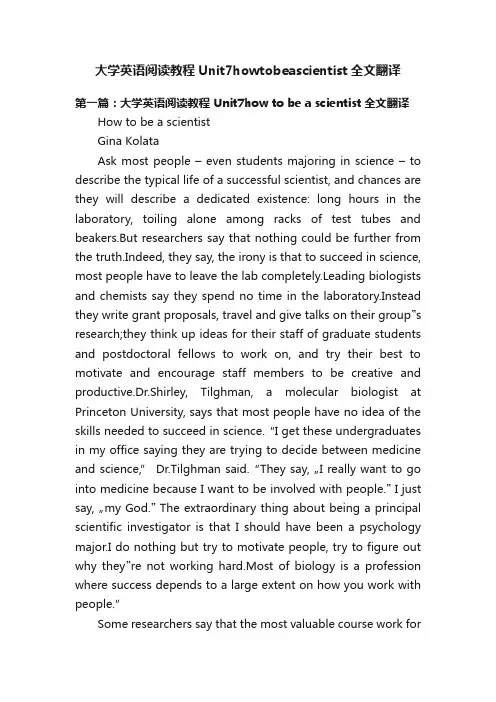
大学英语阅读教程Unit7howtobeascientist全文翻译第一篇:大学英语阅读教程 Unit7how to be a scientist全文翻译How to be a scientistGina KolataAsk most people – even students majoring in science – to describe the typical life of a successful scientist, and chances are they will describe a dedicated existence: long hours in the laboratory, toiling alone among racks of test tubes and beakers.But researchers say that nothing could be further from the truth.Indeed, they say, the irony is that to succeed in science, most people have to leave the lab completely.Leading biologists and chemists say they spend no time in the laboratory.Instead they write grant proposals, travel and give talks on their group‟s research;they think up ideas for their staff of graduate students and postdoctoral fellows to work on, and try their best to motivate and encourage staff members to be creative and productive.Dr.Shirley, Tilghman, a molecular biologist at Princeton University, says that most people have no idea of the skills needed to succeed in science.“I get these undergraduates in my office saying they are trying to decide between medicine and science,” Dr.Tilghman said.“They say, …I really want to go into medicine because I want to be involved with people.‟ I just say, …my God.‟ The extraordinary thing about being a principal scientific investigator is that I should have been a psychology major.I do nothing but try to motivate people, try to figure out why they‟re not working hard.Most of biology is a profession where success depends to a large extent on how you work with people.”Some researchers say that the most valuable course work forscientists may not even be science.Dr.Ponzy Lu, a chemist at the University of Pennsylvania, says his worst memories of his days as an undergraduate at the California Institute of Technology were the humanities courses he and every other science major were forced to take.“We hadto write 500 to 1,000 words a week in essays,” Dr.Lu said.“I wasn‟t good at that kind of stuff.”But as soon as he become a successful scientist, Dr.Lu said he found that rather than puttering around the laboratory conducting experiments, he had to spend his time writing grant proposals, meeting deadlines.Dr.Lu said, writing “is about all I do.” And the dreaded essay writing at Cal Tech was “the most useful thing I learned.” Some scientists are delighted to leave the laboratory and find that they can finally shine when they are judged by their ideas and their administrative skills.Yet even people who feel this way are often loath to admit it, Dr.Lu said, because it is part of the mystique of science to say you love the lab.“It‟s like Jimmy Carter saying he lusted after women,” Dr.Lu said.“You can get in a lot of trouble saying things like that.”But no matter what they think of laboratory work, most researchers say that it was not until they were in graduate school, well on their way to becoming scientists, that they realized what the career path actually is.Dr.Kenneth Gross, a molecular geneticist at Roswell Park Cancer Institute in Buffalo, N.Y., remembers well his epiphany.It happened when he was a graduate student at the Massachusetts Institute of Technology.One day, Dr.Gross was working happily in the lab next to a postdoctoral fellow, Dr.Arthur Skoultchi, who is now at Albert Einstein College of Medicine.Full of enthusiasm, Dr.Gross said, he remarked that “the most incredible thing is that hey paid you towork in a lab.” Dr.Skoultchi, he said, replied, “Enjoy it while you can,” and explained to Dr.Gross what lay ahead.Young scientists move up the ladder from graduate student to postdoctoral fellow to assistant professor to, they hope, recipient of a federal grant.From then on, their time in the lab rapidly dwindles to nothing.Dr.Lu explained that it was not so surprising that most successful scientists ended up as thinkers rather than doers.“That‟s the whole problem with big science,”he said.“You have to have an army of people to do the work.” But, he added, “Part of what makes a person become a scientist is the desire for influence and power.And the only way you can have that is to have a group of people working on your ideas.”A typical research group at a leading university has about a dozen people, paid for mainly by grant money either from the federal government, private groups like the American Cancer Society or companies, that the principal investigator raises.Dr.Lu said that although his salary is paid by the university, he must bring in $300,000 a year to run his lab.This includes paying for equipment and paying the budding scientists who perform the experiments.Graduate students earn about $12,000 a year, some of which, is paid by fellowship;the rest comes from grant money.Postdoctoral fellows receive about $20,000 a year.Some scientists run huge groups that have budgets equal to those of small corporations.Dr.Jerome Groopman, an AIDS researcher at Brigham and Women‟s Hospital in Boston, said his group of about 50 people had an operating budget of $2 million a year.“It‟s clearly a major problem for a lot of people,”said Dr.Tom Maniatis, a molecular biologist at Harvard.“Nowhere in your education are you trained to be a manager or administer.Suddenly you are faced with writing grants andkeeping track of spending.But the most difficult challenge is managing people.I don‟t think scientists are prepared to do that at all.”From the new york times , april4,1993.怎样成为一名科学家问大多数人来形容一个成功的科学家的典型生活,和机会,他们将在实验室中描述了一个专用的存在:时间长,独自之间的试管和烧杯架劳作。
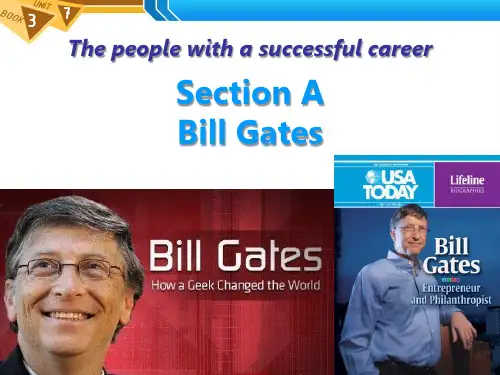
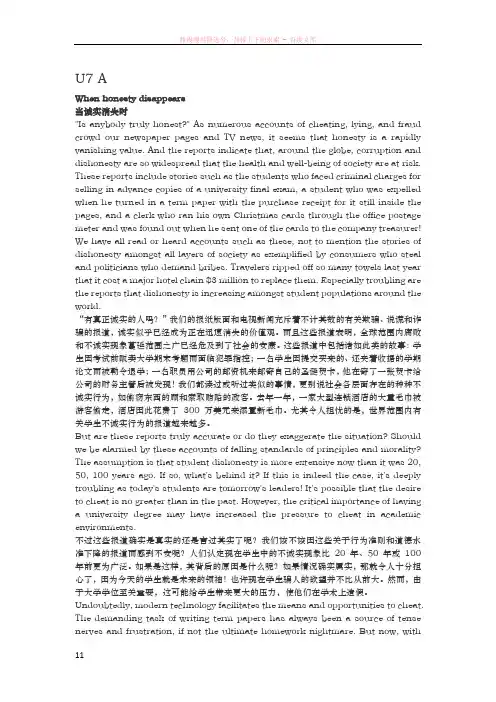
U7 AWhen honesty disappears当诚实消失时"Is anybody truly honest?" As numerous accounts of cheating, lying, and fraud crowd our newspaper pages and TV news, it seems that honesty is a rapidly vanishing value. And the reports indicate that, around the globe, corruption and dishonesty are so widespread that the health and well-being of society are at risk. These reports include stories such as the students who faced criminal charges for selling in advance copies of a university final exam, a student who was expelled when he turned in a term paper with the purchase receipt for it still inside the pages, and a clerk who ran his own Christmas cards through the office postage meter and was found out when he sent one of the cards to the company treasurer! We have all read or heard accounts such as these, not to mention the stories of dishonesty amongst all layers of society as exemplified by consumers who steal and politicians who demand bribes. Travelers ripped off so many towels last year that it cost a major hotel chain $3 million to replace them. Especially troubling are the reports that dishonesty is increasing amongst student populations around the world.“有真正诚实的人吗?”我们的报纸版面和电视新闻充斥着不计其数的有关欺骗、说谎和诈骗的报道,诚实似乎已经成为正在迅速消失的价值观。
![[英语学习]21世纪大学新英语读写译教程 第三册 课文翻译 课件 ppt Unit7](https://uimg.taocdn.com/721cef8651e79b896802268c.webp)
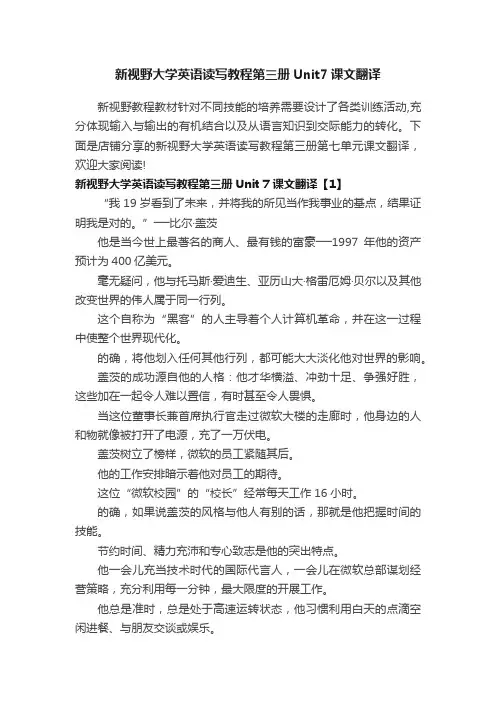
新视野大学英语读写教程第三册Unit7课文翻译新视野教程教材针对不同技能的培养需要设计了各类训练活动,充分体现输入与输出的有机结合以及从语言知识到交际能力的转化。
下面是店铺分享的新视野大学英语读写教程第三册第七单元课文翻译,欢迎大家阅读!新视野大学英语读写教程第三册Unit 7课文翻译【1】“我19岁看到了未来,并将我的所见当作我事业的基点,结果证明我是对的。
”──比尔·盖茨他是当今世上最著名的商人、最有钱的富豪──1997年他的资产预计为400亿美元。
毫无疑问,他与托马斯·爱迪生、亚历山大·格雷厄姆·贝尔以及其他改变世界的伟人属于同一行列。
这个自称为“黑客”的人主导着个人计算机革命,并在这一过程中使整个世界现代化。
的确,将他划入任何其他行列,都可能大大淡化他对世界的影响。
盖茨的成功源自他的人格:他才华横溢、冲劲十足、争强好胜,这些加在一起令人难以置信,有时甚至令人畏惧。
当这位董事长兼首席执行官走过微软大楼的走廊时,他身边的人和物就像被打开了电源,充了一万伏电。
盖茨树立了榜样,微软的员工紧随其后。
他的工作安排暗示着他对员工的期待。
这位“微软校园”的“校长”经常每天工作16小时。
的确,如果说盖茨的风格与他人有别的话,那就是他把握时间的技能。
节约时间、精力充沛和专心致志是他的突出特点。
他一会儿充当技术时代的国际代言人,一会儿在微软总部谋划经营策略,充分利用每一分钟,最大限度的开展工作。
他总是准时,总是处于高速运转状态,他习惯利用白天的点滴空闲进餐、与朋友交谈或娱乐。
微软人笑话他的接待员是天底下最勤奋的人。
事实上,他有几个接待员。
他或许需要有人专门安排他的旅行计划和去国外的签证。
说到旅行,他节约钱和时间也是出了名的。
出差时,他尽可能坐普通民航飞机;为了节省时间,他从不托运行李。
接待他的东道主也发现,他住在城里时他们很省钱。
他的时间表上没有计划旅游的时间,日程表上也没有游览或观光计划。
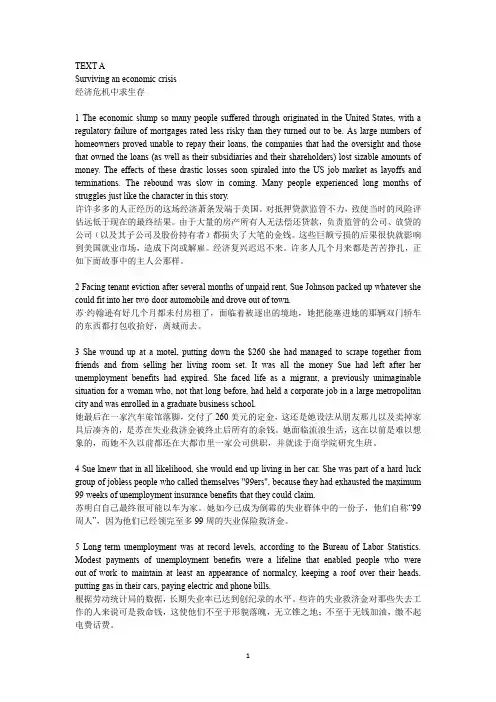
TEXT ASurviving an economic crisis经济危机中求生存1 The economic slump so many people suffered through originated in the United States, with a regulatory failure of mortgages rated less risky than they turned out to be. As large numbers of homeowners proved unable to repay their loans, the companies that had the oversight and those that owned the loans (as well as their subsidiaries and their shareholders) lost sizable amounts of money. The effects of these drastic losses soon spiraled into the US job market as layoffs and terminations. The rebound was slow in coming. Many people experienced long months of struggles just like the character in this story.许许多多的人正经历的这场经济萧条发端于美国。
对抵押贷款监管不力,致使当时的风险评估远低于现在的最终结果。
由于大量的房产所有人无法偿还贷款,负责监管的公司、放贷的公司(以及其子公司及股份持有者)都损失了大笔的金钱。
这些巨额亏损的后果很快就影响到美国就业市场,造成下岗或解雇。
经济复兴迟迟不来。
许多人几个月来都是苦苦挣扎,正如下面故事中的主人公那样。
Unit 7 section A Woman at the management level 女性管理者1When Monica applied for a job as an administrative assistant in 1971, she was asked whether she would rather work for a male or a female attorney. "I immediately said a man," she says. "I felt that a male-boss/female-employee relationship was more natura l, needing no personal accommodation whatsoever." But 20 years later, when she was asked the same question, she said, "I was pleasantly surprised that female bosses are much more accessible to their employees; they're much more sensitive and intimate w ith their employees."1 当莫妮卡 1971 年申请一个行政助理的工作时,有人问她想与男律师共事还是与女律师共事。
“我马上说想与男律师共事,”她说。
“我认为男老板和女雇员的关系更自然,丝毫不需互相调整。
”但 20 年后,有人问她同样的问题时,她说:“令我感到惊喜的是,对员工来说,女上司更容易接近,她们更能理解人,员工更亲密。
”preclude, discard, abandon, eliminate, abolish, dismisspreclude 排除discard 丢弃,抛弃(可指人也可指物)abandon 放弃(某物)eliminate 消除,淘汰abolish (依法)废除dismiss 解雇2 Female bosses today are still finding they face subtle resistance. There is still a seg ment of the population, both men and, surprisingly, women who report low tolerance f or female bosses. The growing presence of femalebosses has also provoked two major questions that revolve around styles: Do men and women manage differently, and, if so, is that a good thing?2 今天的女上司仍然发现,她们面临着不易察觉的阻力。
新视野大学英语读写教程第三册Unit_7_Section_A教案(转载)Unit 7 Section A Bill GatesPart One: Objectives1. To learn the stories of two influential figures;2. To review the reading skill of identifying the writer’s purpose;3. To learn to write a paragraph with a general statement supported by details;4. To learn how to write a speech.Part Two: Warming up1. Who Are They ? Can you figure out who they are with the fewest hints given?Celebrity 1Hint 1: At the age of 71, he won a ¥5,000,000 State Supreme Science and Technology Award, known as the Nobel Prize in China, for his outstanding achievements.Hint 2: His childhood dream was to cultivate rice as plump as peanuts, and farmers can relax in the cool shadow of big rice plants.Hint 3: He is the most famous “farmer” in China and is termed as “father of hybrid rice” .He is Yuan Longping, “father of hybrid rice”.Celebrity 2Hint 1: She is a British writer and the author of a world-famous fantasy series, the idea for which was conceived while she’s on a train trip from Manchester to London in 1990.Hint 2: Released in 1997, her first novel Harry Potter and the Philosopher's Stone gained immense popularity and commercialsuccess.Hint 3: She was ranked by Forbes as the 48th most powerful celebrity of 2007.She is J.K.Rowling, author of Harry Potter fantasy series.Celerity 3Hint 1: She was an Albanian Roman Catholic nun who founded the Missionaries of Charity in Kolkata (Calcutta), India in 1950.Hint 2: For over forty years she ministered(服侍) to the poor, sick, orphaned, and dying.Hint 3: She won the Nobel Peace Prize in 1979 for her humanitarian work. She passed away on 5 Sept., 1997.She is Mother Teresa.2. How much do you know about Bill Gates?1) Th e former chairman of…2) The worldwide leader in…3) He discovered his interest in… at the age of 13.4) In his junior year, he left Harvard University, so as to…5) Guided by a belief that…, he began developing…6) According to Forbes magazin e, he has be en…7) …Bill Gates is the former chairman of Microsoft Corporation, the worldwide leader in software, services and solutions that help people realize their full potential. He was born on Oct. 28, 1955. He discovered his interest in software and began programming computers at age 13. In 1973, Gates entered Harvard University. In his junior year, Gates left Harvard to devote his energies to Microsoft, a company he had established in 1975 with his childhood friend Paul Allen. Guided bya belief that the computer would be a valuable tool on everyoffice desktop and in every home, they began developing software for personal computers. Under Gates' leadership, Microsoft's mission has been to continually advance and improve software technology, and to make it easier and more enjoyable for people to use computers. According to Forbes magazine, Gates has been the richest man in the world since 1995.3. What challenges did Bill Gates meet? And what do you think of that?1) The federal government claimed that …2) This case started when …3) Although Microsoft believed it’s logical, its competitors thought that …4) As far as the case is concerned, I think that …Our top story today is the case being brought against Microsoft by the federal government, accusing the software giant of unfair business practices. It claims the company is keeping a firm grip on the world’s operating system market to squeeze out the competition in other software application areas such as Internet software. Microsoft claims that it is only logical for its company to want to bundle and distribute its software with its operating systems, while its competitors claim that other companies’Internet software deserves equal access to Microsoft’s operating systems. They say that if Microsoft’s operating systems are shipped with its software included, the software of other companies should be included as well.The federal government claims that Microsoft practices unfair business practices, namely, monopoly power to gain advantage over its competitors. This case started when Microsoft bundled its Windows 95 operating system with its Internet Explorer software. Although Microsoft believes it’s logical for itscompany to bundle and distribute its software with its operating systems, its competitors hold their Internet software deserves equal access to Microsoft’s operating systems as Microsoft’s.As far as the case is concerned, however, I think there is no point arguing about who is right or wrong, but the point is to ponder over why Bill Gates’success is the focus of public attention.4. What contributes to Bill Gates’huge success?1) His keen insights into…2) His total commitment to…3) His great skills in managing…4) His competitive ability in…5) …In the first place, it is a return from his keen insights into his future. As he once put it, “At 19, I caught sight of the future …and I turned out to have been right.”In the second, it is a fruit of his total commitment to his pursuits. For example, it was not unusual for the dean of Microsoft to work16 hours a day. In the third, it is a product of his great skills in managing his business. According to his colleagues, he could deal efficiently with technical problems while handling routine affairs. And above all, it is a result of his competitive ability in development of sophisticated IT products. In more than 30 years since he dropped out of Harvard to conquer the world of computer operating systems and application software, in effect, he has been deadly for competitors trying to claw their way into the market.5. From Bill Gates’dropout of Harvard, can we tell that college education means nothing to one’s success?My answer to this question is negative. Because hisexperience on Harvard campus, though unable to produce a direct effect on his success, helped keep his mind open to what was going on in the world of science and render him sharper at what future would hold for him. According to Bill Gates, his experience in Harvard was regarded as “an amazing privilege”. He once said, “ThoughI left early, I was transformed by my years at Harvard, the friendships I made, and the ideas I worked on.”In fact, he learned a lot at Harvard about new ideas in economics and politics. And he got great exposure to the advances being made in the sciences. So actually, the years in Harvard contributed a lot to his future success.6. From his life, what conclusion can we draw as to the relationship between college degree and success?It is widely believed that, the higher degree one earns, the better chance of success on e stands. But Bill Gates’case tells a different story. From his experience, therefore, we can conclude that the college degree is not a guarantee of one’s success in career but a symbol of one’s complete experience with college life or at most a witness to a person’s buildup of knowledge essential to his success in career. As is known to all, Bill Gates didn't finish his bachelor’s degree and dropped out of Harvard, let alone the master’s or doctor’s degree. However, he founded the biggest software company in the world—Microsoft Corporation and with more than fifty billion dollars wealth he has been the richest man in the world, for all of which, however, he didn't depend on his educational diploma! Thus it can be seen that one’s success is built not on the college degree but on his ability bettered by the college life.7. What does the author want to tell us about Bill Gates?Let’s answer this question after we read the passagePart Three: Related Information1. Role modelThe term role model was introduced by Robert K. Merton. Merton says that individuals compare themselves with "reference groups" of people who occupy the social role to which the individual aspires. The term has passed into general use to mean any "person who serves as an example, whose behavior is emulated by others".(1) Robert King MertonRobert King Merton (July 4, 1910 –February 23, 2003) was a distinguished American sociologist perhaps best known for having coined the phrase "self-fulfilling prophecy". He also coined many other phrases that have gone into everyday use, such as "role model" and "unintended consequences". He spent most of his career teaching at Columbia University.(2) Albert EinsteinAlbert Einstein (March 14, 1879 –April 18, 1955) was a German-born theoretical physicist. He is best known for his theory of relativity and specifically mass–energy equivalence, E = mc2. Einstein received the 1921 Nobel Prize in Physics “for his services to Theoretical Physics, and especially for his discovery of the law of the photoelectric effect (光电效应).”Einstein published over 300 scientific works and over 150 non-scientific works. Einstein is revered by the physics community, and in 1999 Time magazine named him the "Person of the Century". In wider culture the name "Einstein" has become synonymous with genius.(3) Mohandas Karamchand GandhiMohandas Karamchand Gandhi (2 October 1869 –30 January 1948) was a major political and spiritual leader of India and theIndian independence movement. He was the pioneer of Satyagraha—resistance to tyranny (暴政) through mass civil disobedience (非暴力反抗) —which led India to independence and inspired movements for civil rights and freedom across the world. In India, he is officially accorded the honor of Father of the Nation. On 15 June 2007, the United Nations General Assembly declared 2 October to be the "International Day of Non-Violence".I want world sympathy in this battle of Right–against–Might. By Gandhi April 5, 1930(4) Mother TeresaMother Teresa (August 26, 1910 –September 5, 1997) was an Albanian Roman Catholic nun who founded the Missionaries of Charity in Kolkata (Calcutta), India in 1950. For over forty years she ministered to the poor, sick, orphaned, and dying, while guiding the Missionaries of Charity's expansion, first throughout India and then in other countries. She won the Nobel Peace Prize in 1979 for her humanitarian work.(5) Bill GatesBorn October 28, 1955, Bill Gates is an American business magnate, philanthropist, and chairman of Microsoft. During his career at Microsoft, Gates held the positions of CEO and chief software architect, and remains the individual shareholder with the most shares, with more than 9 percent of the common stock (普通股).(6) Martin Luther King, Jr.Martin Luther King, Jr. (January 15, 1929 –April 4, 1968) was one of the pivotal leaders of the American civil rights movement. King was a Baptist minister, one of the few leadership roles available to black men at the time. He became a civil rights activist early in his career. His efforts led to the 1963 March onWash ington, where King delivered his “I Have a Dream”speech. In 1964, King became the youngest person to receive the Nobel Peace Prize for his efforts to end segregation and racial discrimination through civil disobedience and other non-violent means.King was assassinated on April 4, 1968, in Memphis, Tennessee. Martin Luther King, Jr. Day was established as a national holiday in the United States in 1986.(7) Jack St. Clair Kilby(November 8, 1923-June 20, 2005) is a Nobel Prize laureate in physics in 2000 for his invention of the integrated circuit in 1958 while working at Texas Instruments (TI). He is also the inventor of the handheld calculator and thermal printer (感热式打印机)2. Microsoft:Microsoft is a company founded by Bill Gates together with his childhood friend Paul Allen in 1975. In the late 1970s a number of individuals and companies were making and distributing home computers. Nobody can honestly say that they predicted back then just how pervasive home computers would become. IBM noticed this phenomenon, and saw it as a way of impressing upon small business just how plain good IBM machines are. IBM did a deal with Microsoft, a small company then, to produce the operating system for their PC. Like many other companies who were unable to predict the huge growth of the PC market, IBM didn’t pay too much attention to the details of the deal. IBM could distribute DOS with their PCs, paying Microsoft a royalty for every copy sold. Microsoft, however, could also sell DOS independently of IBM. The deal withIBM for the distribution of DOS was probably the smartestthing Microsoft has ever done. It was the first of Microsoft’s many successes.3. Paul Allen:At Lakeside School, Paul Allen (14 years old) and friend Bill Gates (12 years old) became early computer enthusiasts. Allen went on to attend Washington State University, though he dropped out after two years to pursue his and Gates’dream of writing software commercially for the new “personal computers”.4. MITS Altair:The MITS Altair microcomputer was the first personal computer available and sold in commercial quantities. MITS originally stood for Micro Instrumentation and Telemetry Systems (微仪表和自动系统公司) but this name was almost never used after 1975. Later, MITS became a subsidiary of Pertec Computer Corp.5. Apple:Apple is a computer company started on April 1, 1976. Steven Wozniak, a high school drop-out who worked for Hewlett-Packard, dabbled in computer-design and created what would become the Apple I. His high school buddy Steven Jobs, also a drop-out, worked for Atari and convinced him that the two should form a company to market the new computer, which eventually took off in 1977 with the Apple II.6. Commodore:Commodore Business Machines, Ltd. (柯摩多尔商务机器有限公司) was founded in 1954 by Jack Tramiel as a typewriter repair shop. After some time in the typewriter, adding machine, and hand-held calculator markets, Commodore became first company to announce that it was producing a consumer-friendlyhome computer (the PET 2001). Before they filed bankruptcy in 1994, Commodore had also managed to produce the world’s first multi-media computer ( the Amiga), and what is still today the best selling computer model of all time (the Commodore 64).7. Tandy:Tandy Corporation (坦迪公司), now known as Radio Shack, is a large manufacturer of electronics and computer accessories and equipment that first entered the electronic market when opening its first Radio Shack in 1921. Today several thousand Radio Shacks are throughout the United States as well as other computer stores such as Computer City. Tandy at this time no longer manufactures computers but is still a large contributor in the computer industry and electronic industry.8. IBMIBM is the best known American computer manufacturer, founded by Thomas J. Watson known as “Big Blue”after the color of its logo. IBM stands for International Business Machines (国际商用机器公司), the largest computer company in the world today. It makes everything from mainframes to personal computers (PCs) and has been immensely successful in selling them, chiefly to business.9. DreamWorks SKG:Steven Spielberg, Jeffrey Katzenberg and David Geffen launched DreamWorks SKG (initials of its founders) in October 1994. Their vision was to create an artist-friendly studio to develop, produce and distribute superior film and music entertainment that would inspire and delight audiences worldwide. DreamWorks SKG is now a leading producer of live-action motion pictures, animated feature films, network, and cable television programming, home video and DVDentertainment and consumer products.Part Four: Text UnderstandingI. Idea CatchingThe Birth of the TextFactor I: There has been an ever-greater curiosity about how Bill Gates’legend came true. Factor II: People wonder what traits in him have led to his success.Factor III: People wonder what challenges he met in his life like others.Author: The author wants to tell others his insight into Bill Gates’life.Personal developmentIn 1975: ⑺Gates and Paul Allen wrote an interpreter for the programming language used by MITS Altair.In 1976: ⑻Gates began licensing Microsoft’s software products directly to computer manufacturers.In 1980: ⑼IBM invited Microsoft to write programming languages for IBM PC.In 1981: ⑽The IBM PC and MS-DOS were bundled together and announced to the public.By 1995: ⑾Roughly 85% of the world’s personal computers were using a Microsoft operating system.In 1997: ⑿Gates was worth an estimated $40 billion.II. Structure Analysis1.What is the text mainly about?2.How is the text organized?This passage is a third-person narrative about the richest businessman in the world—Bill Gates. The whole passage is organized according to “General introduction —Detailed illustrations —Conclusion” pattern. Since the key idea isillustrated from two perspectives, the passage naturally falls into four partsPart I Introduction (Para.1) Main idea: Bill Gates has dominated the personal computing revolution and modernized the whole world in the process. Without a doubt, Bill Gates is one of the greatest minds to ever change the world. (the richest businessman in the world, Bill Gates. )Devices for developing it: Comparison: (Refer to Para. 1) The author compares Bill Gates with Thomas Edison, Alexander Graham Bell, and other great minds who ever changed the world.Part II Illustration I (Para. 2-6) Main idea:What adds to Gates’ big success includes his personal traits: his personality — a blend of high-voltage brilliance, drive and competitiveness; his time management skills; his sense of saving money and time in tr aveling; his incredible “multitasking” ability; and his managing style.(Bill Gates’personal traits resulting in his success )Devices for developing it: General—particular details:This part is typical of the device—from a general statement to particular details. (Refer to Paras. 2, 3, 4, 5, 6)Part III Illustration II (Paras. 7-11) Main idea: Bill Gates’personal development also outlines his steady road to success—In 1975, Gates, together with Allen, laid the first brick in the foundation of Microsoft; In 1976, he began licensing Microsoft’s software products; In 1980s and 1990s, Microsoft quickly dominated the world market; and today the Microsoft “campus”is a home for new ideas and products. (Bill Gates’personal development)Devices for developing it: Time sequence: Time markers and episodes:At his sixth grade (Para. 7): Seeing a psychologist to reveal his personalityAt the age of 19 (Para. 8): Writing the computer programming languageIn 1976 (Para. 9): Licensing Microsoft’s software productsIn 1980s and 1990s (Para. 10): Dominating the world software marketToday (Para. 11): Microsoft campus, a home for new ideasPart IV Conclusion Main idea: As the conclusion of the passage, Gates hopes to be running Microsoft for another 10 years and then he promises to focus on his family and giving his money away. But one can only wonder what he will do in the near future. (Gates’future plan )Devices for developing it: Induction: Known facts: 1) Gates hopes to run Microsoft for another 10 years; 2) Then he promises to focus on his family; 3) He also wants to give his money away.Conclusion: But no one knows what the great mind will do in the near future.Part Five: Notes To The Text☆New words and expressions1. to catch sight of 看到当城里的孩子在乡下看到一群鸭子走过时他们感到无比兴奋。
新起点大学基础英语教程读写教程3 课后翻译完整版(unit1—unit10)LJ制作Unit11.我们先举两个例子。
Let’s start with two examples.2.对于大部分学生而言,英语是大学里最重要的课程之一。
To most students ,English is one of the most important courses in college.3.你需要的只是勇气。
Courage is all you need.4.这项法律不适用于本案。
The law does not apply to this case.5.令我惊讶的是,我找到了书里所描述的地方。
Astonishingly, I found the place described in the book.6.作最好的打算,作最坏的准备。
Hope for the best, prepare for the worst.7.她的姨妈去年去世后,给他留下了300万美元。
Her aunt died last year and left her with three million dollars.8.我无法忍受这个不断加重的课程负担。
I can’t stand this increasingly heavy coursework.Unit21.有好几次我看见简和他们在一起。
I’ve seen Jane with them on several occasions.2.有人向我诶供了一份在日本的工作。
I have been offered a job in Japan.3.他喜欢球类运动,尤其喜欢打乒乓球。
He likes ball games , (and he likes) table tennis in particular.4.小孩子们都喜欢在户外游戏。
Y oung children enjoy playing outdoors.5.他对政治问题感兴趣。
Unit 7 Text ANew Wordsso-soa.& ad.(infml) 不好也不坏的(地)momn. (美口)妈妈incompetencen. 不胜任,不称职* competencen. 能力;称职leisuren. time free from work or other duties; spare time 闲暇hobbyn. 业余爱好;嗜好gymn. (infml) 体操馆;健身房gym shoen. 体操鞋,球鞋solen. 鞋底;袜底a. 唯一的;独占的enthusiastn. 热衷于…的人hopelessa.没有希望的;令人绝望的squeezevt. 1. 硬塞,硬挤2. 挤压,榨n. 1. 挤压,榨2. 经济困难;拮据tightsn. [复]女用(连)裤袜leg warmersn. [复]暖腿套warm-upn. 准备活动;准备练习* overhearvt. 偷听到;无意中听到goal kickn. 球门球* slaughtervt. 1. 屠宰;屠杀2. (infml) (口)使惨败competitionn. 比赛;竞赛;竞争wreckn. 1. (infml) 受到严重损害的人2. 遇难船只;失事飞机等的残骸vt. 造成(船舶等)失事;(喻)破坏startern. 起始者;起始物;(尤其指比赛的)参赛人;参赛马orchestran. 管弦乐队tidyvt. 使整洁,使整齐a.整洁的;爱整洁的tacklevt. 对付,处理(棘手的问题、困难的工作等)* recreationn. 消遣,娱乐self-improvementn. 自我改进,自我修养grimlyad. 坚定地;不屈地left-handeda.(指人)惯用左手的,左撇子的ad. 用左手* insanea. 1. 精神病患者的;为疯人而设的2. (患)精神病的;精神失常的asylumn. 收容所;精神病院insane asylumn. 精神病院sanityn. 神智健全;清醒,明智operan. 歌剧peculiar-lookinga. 奇形怪状的peculiara. 1. 奇特的,古怪的2. (to) 独有的,特有的clayn. 黏土homemadea. 家制的;做得简单粗糙的discouragevt. 使泄气,使灰心* stumblevi. 1. 跌跌撞撞地走2. 结结巴巴地说话gracelesslyad. 不优美地,笨拙地gracen. 1. 优美;风度2. 善意;体谅gracefula. 1. 优美的2. 优雅的;得体的* graciousa. 亲切的,和蔼的Phrases and Expressionstone upmake (one's body) stronger, fitter, etc. 使更强壮,使更健康pull onput (sth.) on by pulling 穿上,戴上a big dealsth. important 了不起的事,大事take upstart to learn or practice (a hobby) 开始从事in good shapein good condition 处于良好状况be committed tocare a lot about (a cause, one's job. etc.); be loyal to (a particular ideal) 献身于,忠诚于squeeze intoforce or press into a narrow or restricted space硬塞进…,硬挤入…as it happens(used before saying sth. surprising) actually; in fact 碰巧,偶然blow it(俚)把这事弄得一团糟keep score(在比赛中)记分get in the way (of sth./of -ing); get in sb.'s way prevent or interfere with sth.; prevent sb. from doing sth.; block sb.'s progress 妨碍;挡道kind of(infml) somewhat; to some extent (口)有点儿;可以这么说eat upuse (sth.) in large quantities 消耗;用完have a shot at(infml) attempt to do (sth.) (口)尝试;试着去做(某事)put offdelay (doing sth.) 推迟;拖延tidy upmake (sb./oneself/sth.) neat and orderly 整理,收拾put a stop toensure that a process, habit, etc., ends and will not be repeated 制止,使停止make sth. out ofconstruct, create or prepare sth. by combining materials or putting parts together 用…做出…fool around behave in a manner that isn't serious; waste time; do sth. just for fun (口)闲荡,混日子out of shapenot fit 处于不良的(健康)状况in no timevery quickly 立刻,马上Unfortunately, doing things badly has gone out of style. It used to be a mark of class if a lady or a gentleman sang a little, painted a little, played the violin a little. You didn't have to be good at it; the point was to be fortunate enough to have the leisure time for such pursuits. But in today's competitive world we have to be "experts" even in our hobbies.遗憾的是,“三脚猫”已经过时了。